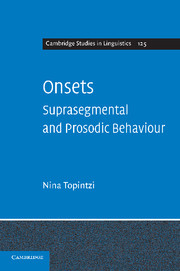Book contents
- Frontmatter
- Contents
- Preface
- Acknowledgements
- 1 Onsets and weight: the theory
- 2 Onsets and stress
- 3 Onsets and compensatory lengthening
- 4 Onsets and word minimality
- 5 Onsets and geminates
- 6 Other real and not so real onset-sensitive data: brief case-studies
- 7 Conclusion and discussion of alternatives
- References
- Subject index
- Language index
6 - Other real and not so real onset-sensitive data: brief case-studies
Published online by Cambridge University Press: 06 July 2010
- Frontmatter
- Contents
- Preface
- Acknowledgements
- 1 Onsets and weight: the theory
- 2 Onsets and stress
- 3 Onsets and compensatory lengthening
- 4 Onsets and word minimality
- 5 Onsets and geminates
- 6 Other real and not so real onset-sensitive data: brief case-studies
- 7 Conclusion and discussion of alternatives
- References
- Subject index
- Language index
Summary
Aims
In the previous chapters, I have been arguing for the existence of onset moraicity by investigating the interaction between onsets and weight. Several case-studies have been explored to this end. In this chapter, this effort is continued, but takes a slightly different route. In particular, I examine a range of languages that fall within two broad categories.
The first refers to languages whose data point to a moraic-onset analysis, but where the available evidence ranges from instances where arguing for onset weight is pretty straightforward, but the data are too sparse or too ambiguous to reach a safe conclusion, to instances that are quite controversial, but still indicative of some onset-weight effect (§6.2). The second category comprises languages which have in the past received analyses that made explicit or implicit use of moraic onsets, but, as I show, this is either misguided – in the sense that such an analysis is not strongly supported – or even entirely incorrect (§6.3).
What, then, is the aim of this chapter? In fact, it is two-fold; first, it raises awareness of several additional languages which are suggestive of moraic onsets. Unsurprisingly, these are typically hardly documented. By addressing them and pointing out the questions they pose, it is hoped that future additional documentation and investigation should be able to clarify their status.
- Type
- Chapter
- Information
- OnsetsSuprasegmental and Prosodic Behaviour, pp. 202 - 229Publisher: Cambridge University PressPrint publication year: 2010



